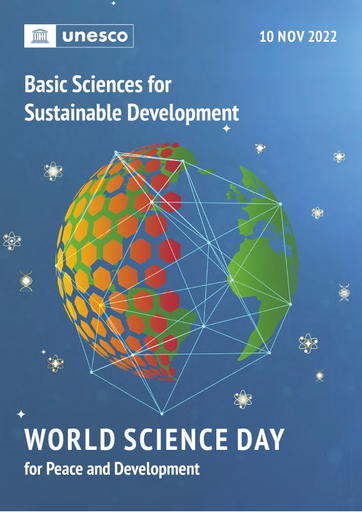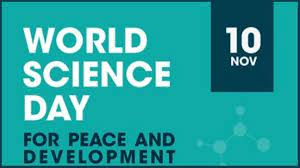World Science Day for PEACE and DEVELOPMENT.
A great day is TODAY 10th November WPRLD SCIENCE DAY!
It is celebrated every 10 November, World Science Day for Peace and Development highlights the significant role of science in society and the need to engage the wider public in debates on emerging scientific issues. It also underlines the importance and relevance of science in our daily lives.
By linking science more closely with society, World Science Day for Peace and Development aims to ensure that citizens are kept informed of developments in science. It also underscores the role scientists play in broadening our understanding of the remarkable, fragile planet we call home and in making our societies more sustainable.
The Day offers the opportunity to mobilize all actors around the topic of science for peace and development – from government officials to the media to school pupils. UNESCO strongly encourages all to join in celebrating World Science Day for Peace and Development by organizing your own event or activity on the day.
Basic Sciences for Sustainable Development
‘The applications of basic sciences are vital for advances in medicine, industry, agriculture, water resources, energy planning, environment, communications and culture’, affirmed the United Nations General Assembly on 2 December 2021, when it endorsed the proposal for an International Year of Basic Sciences for Sustainable Development. World Science Day is contributing to the Year in 2022 by celebrating this theme.
‘We need more basic science to achieve The 2030 Agenda and its 17 Sustainable Development Goals’, the United Nations General Assembly noted in December 2021. It is true that the share of domestic research expenditure devoted to basic sciences varies widely from one country to another. According to data from the UNESCO Science Report 2021 for 86 countries, some devote less than 10% of their research expenditure to basic sciences and others more than 30%.
Having a capacity in basic sciences is in the interests of both developed and developing countries, given the potential for applications to foster sustainable development and raise standards of living. For example, a growing number of people around the world suffer from diabetes. Thanks to laboratory studies of the ways in which genes can be manipulated to make specific protein molecules, scientists are able to engineer genetically a common bacterium, Escherichia coli, to produce synthetic human insulin.
Join the conversation with the hashtags #ScienceDay.

Participate!
The theme of World Science Day on 10 November 2022 is Basic Sciences for Sustainable Development. It is being celebrated within the International Year of Basic Sciences for Sustainable Development, which kicked off on 8 July 2022. Scientists, science communicators and science enthusiasts are encouraged to prepare their own events to celebrate World Science Day.
Background
The organization of a focused event related to the commitment to science and society was one of the positive outcomes of the 1999 World Conference on Science in Budapest. It was considered an opportunity to reaffirm each year the commitment to attaining the goals proclaimed in the Declaration on Science and the Use of Scientific Knowledge and to follow up the recommendations of the Science Agenda: Framework for Action.
Since its proclamation by UNESCO in 2001, World Science Day for Peace and Development has generated many concrete projects, programmes and funding for science around the world. The Day has also helped foster cooperation between scientists living in regions marred by conflict – one example being the UNESCO-supported creation of the Israeli-Palestinian Science Organization (IPSO).
The rationale of celebrating a World Science Day for Peace and Development has its roots in the importance of the role of science and scientists for sustainable societies and in the need to inform and involve citizens in science. In this sense, a World Science Day for Peace and Development offers an opportunity to show the general public the relevance of science in their lives and to engage them in discussions. Such a venture also brings a unique perspective to the global search for peace and development.
The first World Science Day for Peace and Development was celebrated worldwide on 10 November 2002 under UNESCO auspices. The celebration involved many partners, such as governmental, intergovernmental and non-governmental organizations, UNESCO National Commissions, scientific and research institutions, professional associations, the media, science teachers and schools.
The Day aims to:
- Strengthen public awareness of the role of science for peaceful and sustainable societies;
- Promote national and international solidarity for shared science.
NICE

